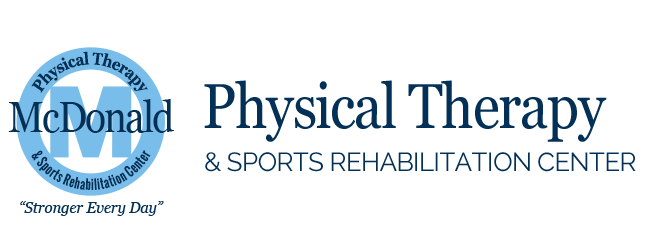Physician Services
Working together with your patients
Physician Services
You want the best for your patients recovering from surgery or suffering from physical impairments. At McDonald Physical Therapy we pride ourselves on making our patients feel like family, and helping them quickly progress to recovery. That includes keeping open communication with their physicians about our diagnosis and treatments every step of the way.
All patients receive a full evaluation from one of our physical therapists, involving a full history, active, passive and resistive tests, and a neurological screening.
We do everything in our power to help patients improve and reach their goals. If a new patient starts therapy on a Friday and has an intense or immediate need for more range following a surgery or acute trauma, we’ll come in during non-office hours Saturday and Sunday and treat them.
Our goal is to make our patients glad they’ve come to us, and glad that you referred them to us. We invite you to see what our patients say about us, and look at the list of injuries we have treated with a high rate of success.
Working With Us
McDonald Physical Therapy has been in practice since 1989 because we believe in service beyond normal expectations. We work closely with the primary care practitioners, orthopedic surgeons, neurosurgeons, neurologists and other specialists in town. Most physicians refer to us to try the conservative approach before referring or performing surgery.
We feel very comfortable with all the injuries mentioned below. We are always available to discuss any of our examination processes and treatments with you, so please contact us. We would also be glad to assist you and/or your colleagues in better understanding how we can assist you with the care of your patients.
Cervical:
- acute cervical strains
- cervical disc protrusions
- herniations with or without neurological deficits
- myofascial pain syndrome
- cervical joint restrictions
Shoulder:
- shoulder pain
- rotator cuff tendonitis
- adhesive capsulitis
- labrum tears
- rotator cuff tears
- scapular diskynesis
- muscle imbalances
- total shoulder replacements
Elbow:
- lateral epicondylitis
- medial epicondylitis
- fractures in radius or ulnar
- ligament strain
- biceps or triceps tendonitis
- ulnar/radial nerve restriction
Wrist/Hand:
- carpal tunnel
- wrist tendonitis
- carpal subluxation
- colles fracture
- phalanges/carpal fractures
- thumb tendonitis
Lumbar:
- ligament strain/sprain
- muscle strain
- myofascial pain syndrome
- disc protrusion
- disc herniations with/without neurological deficits
- sacroiliac joint dysfunction
- iliosacral dysfunction
- muscle imbalance
- degenerative disc disease
- spinal stenosis
Hip:
- muscle strain
- muscle imbalance
- trochanteric bursitis
- piriformis syndrome
- adductor strain
- total hip replacements
Knee:
- medial collateral, lateral collateral, posterior cruciate and or anterior cruciate
- ligament strain
- quadriceps/hamstring strain
- patella tendonitis
- patella femoral syndrome
- meniscal tear/ contusion
- pes anserine bursitis
- osgood schlater
- muscle imbalance
- femoral fracture
- partial/total knee replacements
Ankle/Foot:
- ligament sprain/strain
- bunionectomy
- total ankle replacement
- achilles tendonitis/tendonopathy
- plantar fasciitis


